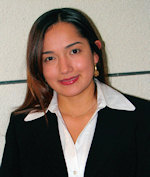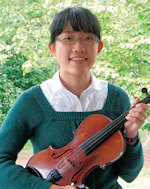A sampler of ELI students: class of 2008
The world is flat,” Thomas Friedman wrote in a recent bestseller. Whatever he meant by that, we might interpret it at the ELI to mean we are all global citizens, and borders and boundaries, whether political, cultural or economic, are secondary. The following students each embody that view in different ways. They have been chosen to represent the class of 2008.
Resolving conflict in Colombia
 |
| Paolo Betancourt |
At the February graduation, valedictorian Paola Betancourt offered her classmates a positive message.
“The most important thing,” she said, “is that you believe in yourself, your dreams and your objectives.”
Heartfelt advice the diminutive Colombian has tried to follow in her own life. It helped when, three years ago, she quit a high-paying job and began assisting paramilitary combatants in war-torn Colombia reintegrate into society.
In her position as research associate for the Praxis Institute for Social Justice, Paola interviewed more than 500 people. To get them to share their often-painful stories, she had to gain the trust of both victims and perpetrators of the violence, some of whom were in jail.
“The most difficult was a man who had raped two or three women,” she said. Despite the obstacles, Paola was determined to carry out the investigation. In fact, if Paola’s middle name were not “Andrea” it could be “Determination.” That quality became quickly apparent at the ELI, when the Level III student announced to her teachers her intention to pass the TOEFL and apply to graduate school––in only one session. Hard work and drive enabled her to earn scholarships twice to extend her stay, progress to Level VI in four months, and graduate at the top of her class.
That resolve appeared early in her life, when, as a child, she decided that she wanted to “do something important.”
After graduating in government and international relations from Universidad Externado de Colombia, she became an adviser to government programs on armed conflict and post conflict topics, working for the mayor of Bogotá and for the vice president of Colombia. When she learned of a project on post-conflict resolution led by anthropology professor Kimberly Thieron of Harvard University, she applied.
Her friends thought she was crazy to quit her job with a private company to take a temporary position at a much lower salary. But Paola was adamant in her decision and in three months was promoted to research associate, a position she still occupies three years later. The results of her investigations were published in scholarly journals and helped establish her reputation as a solid researcher in her field.
“All the things I do, it’s not about the reward,” she said. “It’s because I’m learning or I’m happy doing them. • BM
Editor’s note: At press time, Paola directs the Office on Crime and Violence in Medellin, Colombia, and is applying to graduate school in the United States.
A fiddler from Japan
“I really like bluegrass music. I like to listen to it, I like to watch it, and I like to play it.”
 |
| Naoko Ichioka |
These are the words of Naoko Ichioka, a student from Kobe, Japan, who is well known at the ELI for her improbable talent: playing the fiddle.
Naoko was first captivated by fiddle music when, as a young girl, she saw a western band playing bluegrass music at Tokyo Disneyland. Thereafter, she made a point to see that band every time she went to visit her grandmother in Tokyo. This early introduction to bluegrass may have been the impetus which led Naoko to join a bluegrass club at Kobe University when, as a 19-year-old student at nearby Kobe Shoin Women’s University, she was searching for a music club to join.
“When I went to visit the club for the first time, everyone there looked cheerful and happy. That's one reason why I wanted to join,” she said.
Although Naoko had played piano as a young child, she had no experience with violin or fiddle and very little experience reading music. But, unlike the piano, the fiddle grabbed her heart, and this, along with the encouragement, support and tutelage of the older members of the club, gave Naoko the motivation to practice daily and quickly develop her skills.
Her prized possession is a very rare 100-year-old Suzuki violin, which she got for an excellent price. With this violin she has played at festivals, churches and pubs in Japan. Her favorite venue is the Kobe Town Festival held yearly at the Port of Kobe. Here in Delaware, Naoko has played at Creamery Farm, local churches, ELI graduation and at the Delaware Valley Bluegrass Festival, where she was excited to meet many other amateur fiddle players as well as professionals.
Where else has Naoko's fiddle playing taken her? Well, to Nashville, Tennessee, of course. In September 2008 she attended an international bluegrass festival, where she joined all-night jam sessions with musicians from around the world. • DD
Promoting public safety in Argentina
 |
| Miriam Benitez |
“It’s a win-win situation,” explains Miriam Benitez with regard to her consulting work in safety and accident prevention. Such a statement could apply equally to Miriam’s experience as an ELI student and her attitude toward life in general.
Beginning her professional life as an attorney, Miriam has pursued a multi-faceted career, always oriented toward service to her native Argentina and beyond. Her accomplishments include two master’s degrees, serving as a provincial legislator, teaching at three Argentine universities, giving seminars on both sides of the Atlantic, writing numerous publications, and most recently, serving as advisor to the head of government and the chamber of deputies of her province.
The field of accident prevention is the major focus of Miriam’s current work as a consultant in the private and public sector and a university professor. She is particularly passionate about the need to prevent automobile accidents among young people.
“Young people feel they are immortal,” she explains, “but accidents are still the second cause of death for young people in the world.”
Miriam has also done extensive work in vehicle ergonomics and work-related accident and injury prevention. In her consulting work, she strives to convince corporate managers that keeping employees safe and healthy benefits both workers and companies, often at no extra cost.
“Eighty percent of [accident and injury] prevention is free,” she explains.
In addition to her demanding professional responsibilities,Miriam has found time to raise four sons. Even though she had never imagined coming to the United States to study, she followed the recommendation of a friend and applied to the ELI, initially for just one session. Her experience has exceeded her expectations in every way. Studying English with the same tireless enthusiasm that has characterized her life’s work, Miriam has found the ELI’s multicultural environment to be uniquely enriching and has decided to stay as long as possible. Her hope is that with increased English proficiency she can extend her consulting work to the United States, with the specific goal of serving the Hispanic immigrant community.Miriam’s interest in that community goes back many years and resulted in her being invited to the National Association of Latino Elected and Appointed Officials Conference in San Diego, California, in June 2008. This conference featured two speakers of particular interest to Miriam, presidential candidates John McCain and Barack Obama.
Although the life of an ELI student might seem a little boring to a woman so accustomed to public life, Miriam loves it and has made herself at home in the ELI community.
“It is important for the ELI to have some more mature students,” she said, smiling. “Language study is not only for young people.”
Certainly her classmates and teachers would agree, having benefited from her warm friendship, enthusiasm and remarkable life experience. • GW